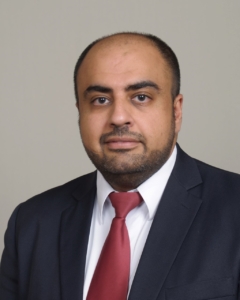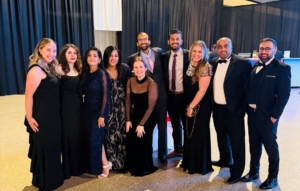October 30, 2024
Behind the stethoscope: A conversation with Dr. Osman Saleem

Osman Saleem, MD Medical Director, Mercy Hospital of Buffalo
We’re honored to host, and even launch, the careers of so many incredible healthcare professionals who are not only experts in their field but also dedicated to the health and vitality of their community. We caught up with Dr. Osman Saleem, Medical Director for our hospital medicine practice at Mercy Hospital of Buffalo in Buffalo, New York, to go behind the stethoscope and learn more about how he came to Sound and his leadership journey:
When did you first consider a career in medicine?
I was born and raised in the Middle East, Saudi Arabia, before immigrating to Toronto with my family. It was my father’s dream to have a child become a physician, and his support motivated me to pursue medicine. I went to the University of Toronto and finished my Bachelor of Science there in 2013.
I attended medical school in America and completed my residency at the Catholic Health Internal Medicine program in Buffalo, New York. While there, I was first introduced to the hospitalist team from Sound Physicians.
I interacted with Sound clinicians during my residency, and seeing the impact they had on the patients and hospital leadership was inspiring. I saw how they approached problems and put out fires. I appreciated the fact that there was always a fallback plan. Most of all, I saw how they supported each other. Seeing that led me to the hospital medicine program, where I began my medical career once my residency concluded.
What keeps you at Sound?
I began as a nocturnist with Sound, otherwise known as a hospitalist who cares for patients at night. At that time, our program was facing some ups and downs in our site

Mercy Hospital of Buffalo team attending a gala.
leadership stability, as well as a robust turnover rate for clinicians. This resulted in recruiting difficulties because clinicians didn’t see stability in the practice’s leadership.
I remember thinking back to how I saw the Sound team during my residency and was bothered by how much the program’s reputation had changed. My main reason for joining Sound was the favorable position they held in the eyes of hospital administration. I wanted to get back to where we were, to give back to the program that gave my career a place to start, and to provide stability to my fellow providers. When the opportunity arose to step into the medical director role here, I jumped at the chance to make a difference.
In the back of my mind, I held the image of a once-prestigious Sound hospitalist program and the positive relationship once held with hospital administration. It was my job to work back to that program and gain that respect back. Thanks to God, we have achieved that goal. With a steady influx of physicians and an excellent relationship with our hospital partner, we have maintained this program’s stability for the past three years.
How has Sound supported your leadership development?
From the very start of my transition to medical director, I have enjoyed the incredible support, education, and development needed to fulfill the duties of this position. Coaching from the chief ambassadors [our traveling clinicians], specifically Dr. Rick Fein, helped hone my personal development as we supported my program’s goal of stable leadership. Never once have I felt alone in my leadership journey.
I have also participated in Sound’s yearly Medical Director Summit (MDS). MDS has helped me interact with other program directors from across the U.S. While there, we share good ideas, focus on areas of improvement, promote practice change models, and discuss important growth areas such as patient engagement. It’s a huge opportunity that I get so much out of every year.
What makes your hospital medicine practice stand out from others in the healthcare industry?
Something that makes us unique is our team dynamic. It’s something that gets noticed, especially by physicians looking to join our Sound team. When prospective providers visit

Mercy Hospital of Buffalo team.
the hospital for their on-site interview, they have the chance to interact with our team. They see our cohesiveness, they see the bonds, and they see the way our providers value each other. Their interactions are professional yet very collegial and supportive of one another.
Our team’s bond with each other supports a type of flexibility not seen in most other healthcare programs. It helps us know each other deeper than just our work. We understand each other’s personal and family situations, so if a need arises, we can handle it accordingly. We watch out for our fellow providers and others in the program and have their back.
What does bringing better to the bedside mean to you?
To me, bringing better to the bedside means providing the same care to patients that I would expect to be provided to myself and my family. Doing so changes your perspective and mindset. It allows for better communication and more compassion in how you deliver care. The whole team brings better in this way, and we pride ourselves on the positive feedback we get from patients who receive our care.
